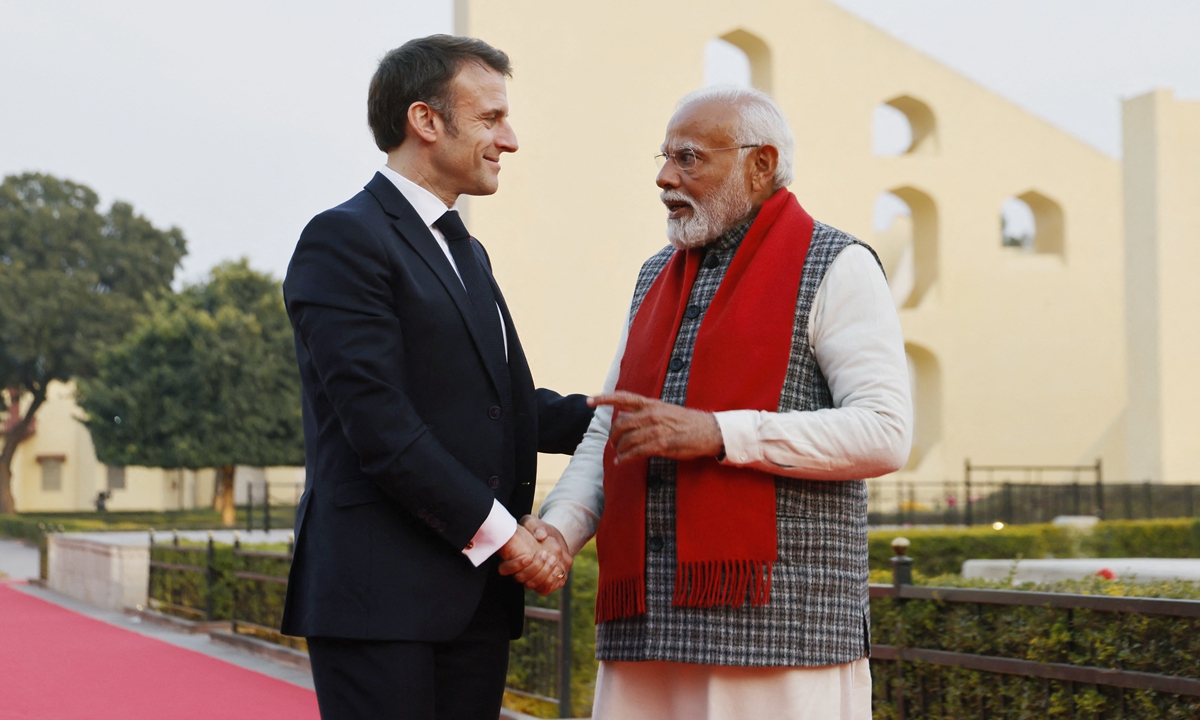
Photo: AFP
"Americans will commit all the stupidities they can think of, plus some that are beyond imagination," thundered former French president Charles de Gaulle. His words ring truer than ever now as we see the US simultaneously wage a proxy war against nuclear-powered Russia, trade and tech wars against industrial powerhouse China and a potentially catastrophic war in the Middle East. Desperate to hold on to the fleeting unipolar moment, the US is also alienating allies and partners such as France and India, who are pursuing strategic autonomy. One illustration of this trend might be French President Emmanuel Macron attending India's 2024 Republic Day parade on January 26, after US President Joe Biden backed out at the last minute.
France has consistently exhibited an independent streak, even though its relative power has shrunk considerably since the days of Napoleon. What reflects this better than president de Gaulle recognizing the People's Republic of China in 1964 or kicking NATO forces out of France in 1966? While France re-joined NATO later and is now a reliable member of the G7, the French have not lost their maverick attitude.
Last year, French President Macron went to Beijing and enjoyed a "love fest," as the New York Times put it. Of course, the sophisticated French have always been fascinated by Chinese civilization. In the 18th century, Voltaire - one of the greatest French souls - profoundly admired and wrote prodigiously about Chinese literature, philosophy, societal norms, art and statecraft.
President Macron, on his return from China, warned - to great chagrin of the Western establishment - that European countries should not accept being "vassals of the USA." He also talked about the unfair nature of the extraterritoriality of the US dollar, and the need for Europe to embrace dedollarization. Last year, France concluded a couple of major business transactions in Chinese yuan, including a momentous deal between France's Total Energies and China National Offshore Oil Corporation. This development might herald the emergence of "Petroyuan" and pose a substantial challenge to the dominant Petrodollar regime.
Macron also went on to say that Taiwan question is not a European concern. Later, France blocked NATO's attempt to extend to Asia - to Japan, in particular.
On the other side of Eurasia, US-India relations have been on the decline. The simmering disagreements have boiled over with allegations about the Indian government's involvement in a plot to assassinate Sikh separatists in Canada and the US. The inability to resolve this issue was among major causes for Biden cancelling his visit to the Republic Day parade.
However, the core problem runs deeper. And that is India refusing to become an "ally" like Japan or Europe. In other words, Americans expect Indian foreign policy and geopolitical strategy to be nearly 100 percent aligned with that of the US.
However, this is mission impossible for India.
Take Russia, for example, whom the US would like to turn into a global pariah. India cannot afford to alienate Russia. First, two-thirds of Indian military hardware - including tanks and fighter jets - are of Russian origin. Second, Russia has been a reliable and sincere ally of India for decades, and thus enjoys loyal support in various segments of Indian foreign policy establishment.
More importantly, India's elites understand the big picture: The West is declining and the East is rising. The economic, technological, geopolitical and military centers of the world are reverting back toward Asia. After all, for nearly 2,000 years, China and India were the two largest economies of the world. The inexorable wheels of history are turning, and the transformation is accelerated by America's self-inflicted wounds.
Indian External Affairs Minister Subrahmanyam Jaishankar has repeatedly talked about the emerging multipolar world, which is really the default state of the world. As he puts it, the operating principle of the multipolar world involves "legitimate pursuit of flexibility without seeking exclusivity."
India has the potential to become the third-largest economy in the world and, thus, one of the key poles of the new world. To continue growing rapidly, India must leverage energy from Russia and the Middle East, manufacturing know-how and other technologies from China, and trade with the Global South. BRICS will continue to expand and create a new financial order that is independent of the US dollar and the SWIFT system. Thus, the strategic imperative for India is to embrace multilateralism and policies of non-alignment or all-alignment.
The transition to and maintenance of a multipolar world will be challenging, not just for India and France, but for everyone from China to Saudi Arabia, Moscow to Lisbon, and Africa to Latin America. Everyone must work together to create a stable, win-win architecture for the coming multipolar world. Is that the crux of the discussions between President Macron and Prime Minister Modi?
The author is a geopolitical analyst, columnist, blogger, podcaster, and writer based out of Bangalore, India. His work can be found on Substack, X and more. opinion@globaltimes.com.cn




